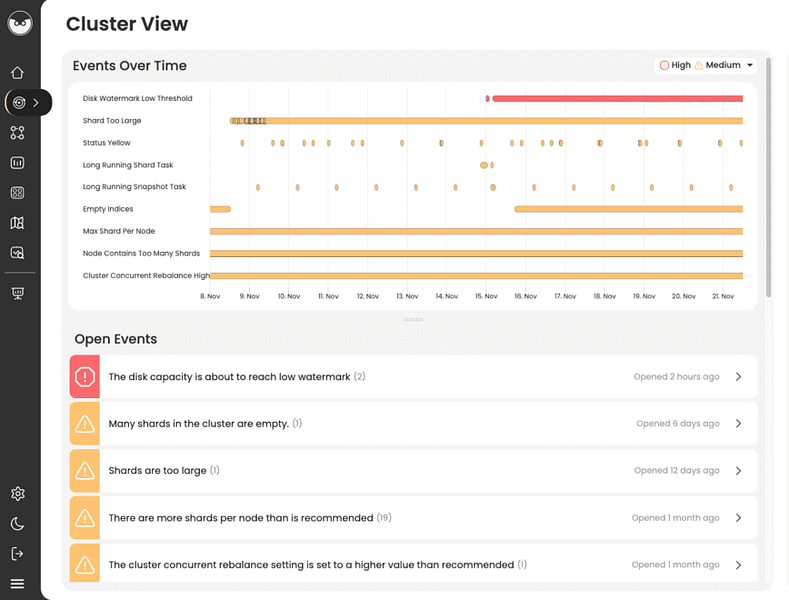Opster Team
Before you begin reading this guide, we recommend you try running the Elasticsearch Error Check-Up which analyzes 2 JSON files to detect many configuration errors.
To easily locate the root cause and resolve this issue try AutoOps for Elasticsearch & OpenSearch. It diagnoses problems by analyzing hundreds of metrics collected by a lightweight agent and offers guidance for resolving them.
Take a self-guided product tour to see for yourself (no registration required).
This guide will help you check for common problems that cause the log ” SAML message cannot be Base64 decoded ” to appear. To understand the issues related to this log, read the explanation below about the following Elasticsearch concepts: plugin.
Overview
A plugin is used to enhance the core functionalities of Elasticsearch. Elasticsearch provides some core plugins as a part of their release installation. In addition to those core plugins, it is possible to write your own custom plugins as well. There are several community plugins available on GitHub for various use cases.
Examples
Get all of the instructions for the plugin:
sudo bin/elasticsearch-plugin -h
Installing the S3 plugin for storing Elasticsearch snapshots on S3:
sudo bin/elasticsearch-plugin install repository-s3
Removing a plugin:
sudo bin/elasticsearch-plugin remove repository-s3
Installing a plugin using the file’s path:
sudo bin/elasticsearch-plugin install file:///path/to/plugin.zip
Notes and good things to know
- Plugins are installed and removed using the elasticsearch-plugin script, which ships as a part of the Elasticsearch installation and can be found inside the bin/ directory of the Elasticsearch installation path.
- A plugin has to be installed on every node of the cluster and each of the nodes has to be restarted to make the plugin visible.
- You can also download the plugin manually and then install it using the elasticsearch-plugin install command, providing the file name/path of the plugin’s source file.
- When a plugin is removed, you will need to restart every Elasticsearch node in order to complete the removal process.
Common issues
- Managing permission issues during and after plugin installation is the most common problem. If Elasticsearch was installed using the DEB or RPM packages then the plugin has to be installed using the root user. Otherwise you can install the plugin as the user that owns all of the Elasticsearch files.
- In the case of DEB or RPM package installation, it is important to check the permissions of the plugins directory after you install it. You can update the permission if it has been modified using the following command:
chown -R elasticsearch:elasticsearch path_to_plugin_directory
- If your Elasticsearch nodes are running in a private subnet without internet access, you cannot install a plugin directly. In this case, you can simply download the plugins and copy the files inside the plugins directory of the Elasticsearch installation path on every node. The node has to be restarted in this case as well.
Log Context
Log “SAML message cannot be Base64 decoded”classname is SamlAuthnRequestValidator.java We extracted the following from Elasticsearch source code for those seeking an in-depth context :
private byte[] decodeBase64(String content) {
try {
return Base64.getDecoder().decode(content.replaceAll("\s+"; ""));
} catch (IllegalArgumentException e) {
logger.info("Failed to decode base64 string [{}] - {}"; content; e);
throw new ElasticsearchSecurityException("SAML message cannot be Base64 decoded"; RestStatus.BAD_REQUEST; e);
}
}
private byte[] inflate(byte[] bytes) {
Inflater inflater = new Inflater(true);
Find & fix Elasticsearch problems
Opster AutoOps diagnoses & fixes issues in Elasticsearch based on analyzing hundreds of metrics.
Fix Your Cluster IssuesConnect in under 2 minutes

Lourens Rozema
CTO at Omnidots





